
Lufa Farms is again changing the skyline in Montreal, thanks to the opening of its second greenhouse facility.
Lufa Farms is again changing the skyline in Montreal, thanks to the opening of its second greenhouse facility.
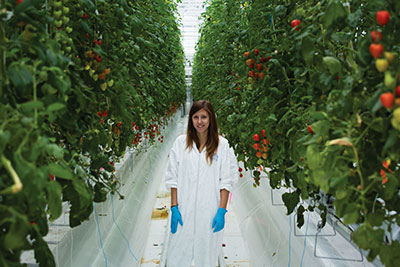 |
|
| Lauren Rathmell, a founding member and the greenhouse director at Lufa Farms. Advertisement
|
The company opened the world’s first commercial rooftop greenhouse in early 2011, a 31,000-square-foot facility in the Ahuntsic-Cartierville borough of Montreal.
This past August, the first crops were planted in the newest greenhouse, which is located in Laval. It’s a 43,000-square-foot facility with all the bells and whistles of leading edge technology.
A third greenhouse in the Montreal area is in the planning stages, and the company has plans to expand to Boston, Chicago and Toronto.
DESIGN CAN BE REPLICATED ON OTHER ROOFTOPS
Lufa’s system is scalable and can be replicated on new rooftops in any city. “This greenhouse puts high-yield, rooftop agriculture within the reach of any new building development, in any city, on spaces public or private, anyplace in the world,” says Mohamed Hage, founder and president of Lufa Farms.
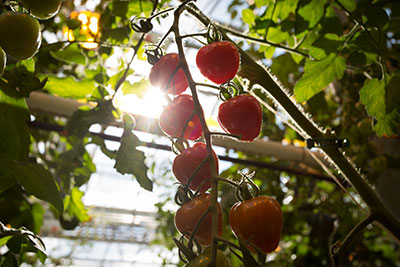 |
|
| A variety of novelty tomatoes are available. |
|
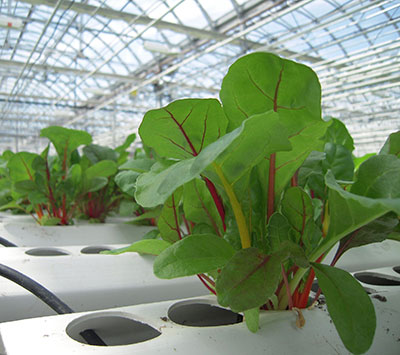 |
|
| Rainbow chard plants. |

|
||
| Ladybugs are used to help control aphids. |
|
|
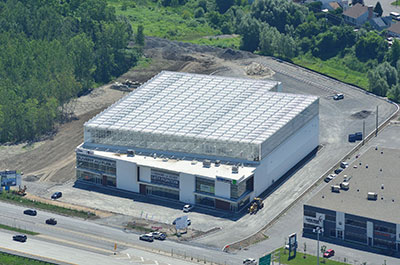 |
||
|
The new Lufa Farms greenhouse facility. |
||
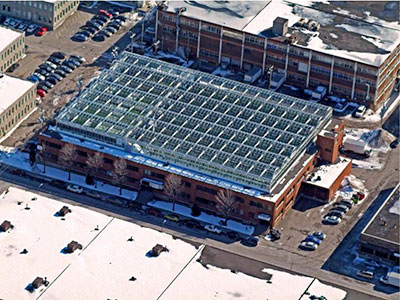 |
||
| Lufa Farms opened the world’s first commercial rooftop greenhouse in 2011 in the Montreal neighborhood of Ahuntsic-Cartierville. | ||
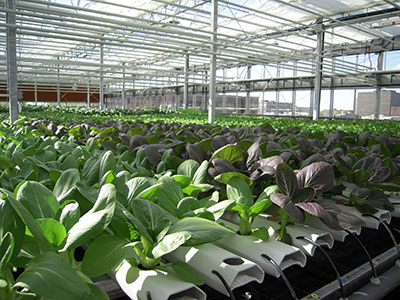 |
||
| Bok choy is one of the specialty crops being grown. | ||
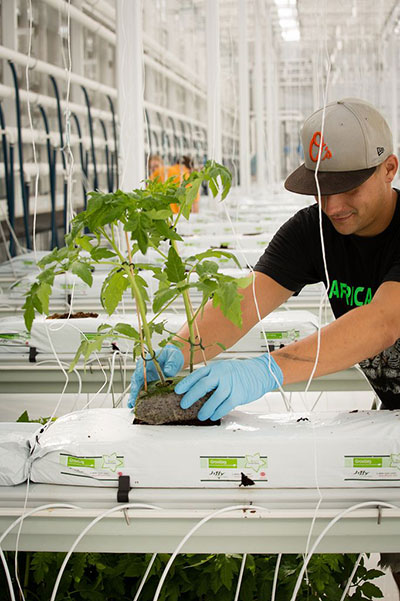 |
||
| The first crops in the new greenhouse were planted last summer. | ||
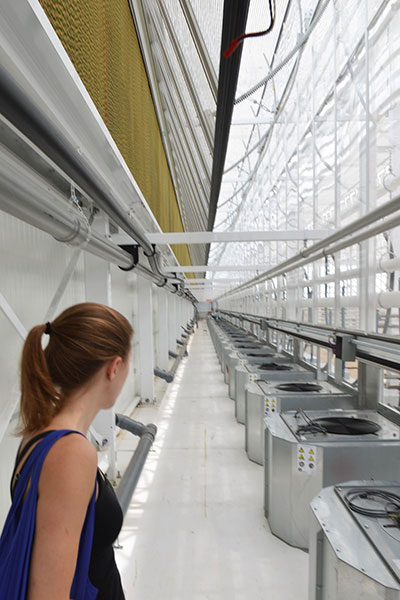 |
||
| A view of the Ultra Clima environmental control system. | ||
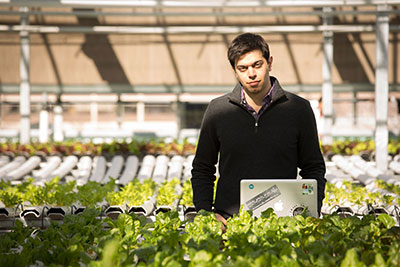 |
||
| Mohamed Hage is CEO and founder of Lufa Farms. | ||
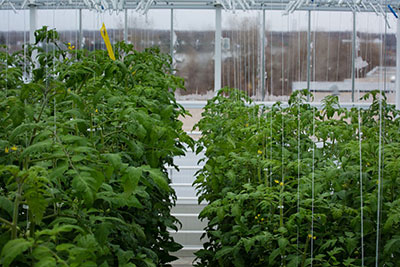 |
||
| Looking over the neighbourhood from the new greenhouse. | ||
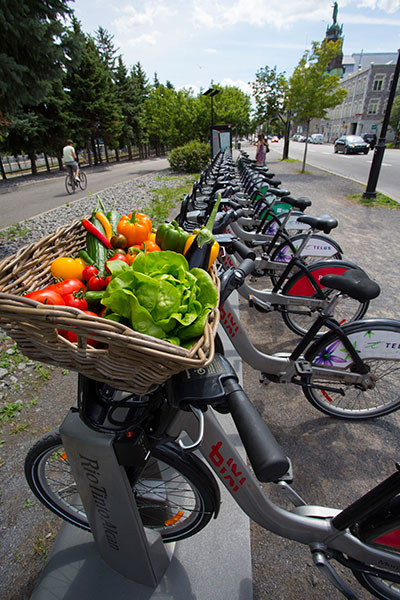 |
||
| Distribution centres are conveniently located for easy access by consumers. |
||
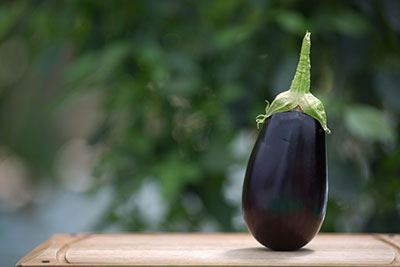 |
||
| Eggplant is the minor crop at the new greenhouse. |
Construction of the new greenhouse, situated atop a new mixed-use commercial building along Highway 440, involved collaboration among Lufa Farms, Le Groupe Montoni Division Construction of Laval, and the Kubo greenhouse manufacturing company based in the Netherlands.
Featured in the newest greenhouse is Kubo’s Ultra Clima system, a semi-closed greenhouse design.
There are no roof vents, resulting in maximum light penetration.
SYSTEM ENSURES AN OPTIMAL ENVIRONMENT
Air is drawn into the greenhouse, climatized in the Ultra Clima chamber, and circulated within the crop via tubes running below the troughs. The air can be heated, cooled or humidified, and CO2 can be added to ensure an optimal growing environment.
“Our building is a shining example of an entirely new model of commercial construction, something that is clean, energy-efficient and contributing to the well-being of the community,” says Dario Montoni, president and chief executive of Le Groupe Montoni.
“We build millions of square feet of buildings every year. If we put a greenhouse on each and every one, Montreal would produce enough vegetables to feed itself year-round within 10 years.”
The new greenhouse “represents the culmination of the past few years in terms of our technological development,” explains Lauren Rathmell, a founding member and the greenhouse director at Lufa Farms.
“We now have a cloud-based method to efficiently and sustainably feed cities using limited resources. And by partnering with Montoni and Kubo, we’ve been able to develop a complete tech-driven food system from seed to plate.”
With information learned from the first greenhouse, the Lufa team introduced a number of changes with the new facility, including improved cropping and irrigation systems.
“We were much better prepared to design this greenhouse,” says Rathmell.
PROPRIETARY TECHNOLOGY BEING DEVELOPED WITH PROJECTS
Much of the technology is proprietary, including the irrigation and cropping systems. “We developed a lot of specialized growing methods and tools to grow on a rooftop.”
They developed their own iPad app, for example, to log crop-scouting data. Lufa Farms uses biocontrols for pest management only. “We scout every row, every week.”
Heating costs are lower with a rooftop greenhouse, largely because it’s insulated from below year-round.
The energy costs of the original greenhouse are about 70 per cent of the industry average. The savings with the new greenhouse should be even greater, because they’ve installed newer energy curtains with an even higher insulating factor.
“It was such a big learning curve the first year,” Rathmell explains. “We had to develop some of the tools as we went along.”
The original greenhouse grew a variety of crops to fill consumer baskets. This was a major challenge for the growers, because they were setting environmental conditions that had to work for so many different crops.
CROP SPECIALIZATION NOW POSSIBLE WITH SECOND FACILITY
However, with the addition of the second greenhouse, Lufa is now able to divvy up the crops. The new greenhouse will grow mostly tomatoes (about 20 varieties) with some eggplant production, while the original greenhouse will handle cucumbers, peppers and greens.
Distribution will be centralized at the original greenhouse, which is only a short drive away.
Consumers have been quite supportive of year-round deliveries of fresh produce, grown only minutes away from their homes or offices. The company’s philosophy is to grow food where people live and grow it more sustainably.
Rainwater is collected, and all irrigation water is recirculated. All organic waste is composted.
The food baskets are delivered to distribution centres each week. Lufa also works with local farms to provide things they don’t grow, such as potatoes, berries and honey. They soon hope to add milk, eggs and cheeses, among other locally sourced foods.
Customers can customize their baskets via Lufa’s online marketplace.
With the successful completion of its Laval site, Lufa Farms has demonstrated the strong commercial viability of its concept. It’s attracted considerable international media attention.
“There’s a very large global opportunity that has opened up in comprehensive food production and distribution models for cities,” said Dave Furneaux, a Boston-based investor and chairman of the board for the company.
“This team has proven that their breakthrough business model works in Montreal and that they have the technology and vision to continue to scale both locally and globally.”
Print this page